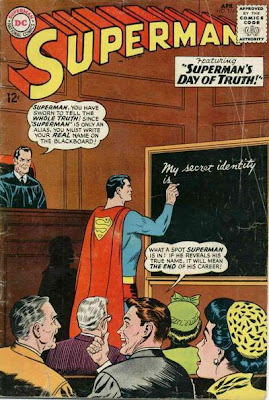Friday, July 16, 2010

- Check out the comic book cover above for Superman #176 (published way back in 1965). Superman has apparently just been sworn in as a witness, presumably at a criminal trial, and has been asked to state his name for the record. Why he decided to answer via chalk on a chalkboard seems peculiar, despite the dilemma he faces in revealing his identity in open court. Surely, the prosecution previously addressed this matter via motion in limine to thwart any attempt to place the Man of Steel in this tough spot. In fact, considering Superman’s role as a crimefighter, it is very likely that it would be the prosecution calling him as a witness to testify against the defendant, which begs the question: Why would the prosecution place Superman in this terrible, terrible position? Of course, the best bet may be for Superman to reply that his name is Kal-El, the moniker given to him by his Kryptonian parents. How could the defense attorney object to that?
- “[W]e face a media landscape that would have been almost unrecognizable in 1978. Cable television was still in its infancy. The Internet was a project run out of the Department of Defense with several hundred users. Not only did Youtube, Facebook, and Twitter not exist, but their founders were either still in diapers or not yet conceived.” Fox Television Stations, Inc. v. Federal Commc’ns Comm’n, — F.3d —-, 2010 WL 2736937, at *7 (2d Cir. July 13, 2010) [PDF]. It was in that opinion that the Second Circuit struck down the FCC’s so-called “fleeting expletives” policy. We here at Abnormal Use are not certain why the court felt it necessary to reference the conception of social media company founders (and we wonder if some federal law clerk had to do that math). For more on that opinion, see this post by Christine A. Corcos at the Media Law Prof Blog.
- A lesson from the Third Circuit: If you a a corporate officer that is a party to litigation, and your Chief Financial Officer is on the stand at trial testifying, don’t send him text messages about his testimony while the judge is conducting a sidebar with counsel. It’s generally bad form, and the judge will declare a mistrial. For more, see this post by Jeffrey Kuntz at The Florida Legal Blog.
- J. Benjamin Stevens at the South Carolina Family Law Blog offers this post about the perils of litigants posting about themselves on Facebook.
- Speaking of which, the South Carolina Court of Appeals this very week released Jennings v. Jennings, an opinion in which the issue was a husband’s claim that his wife had improperly logged into his Yahoo account, printed emails about his purported girlfriend, and provided said emails to her attorney and an investigator.















